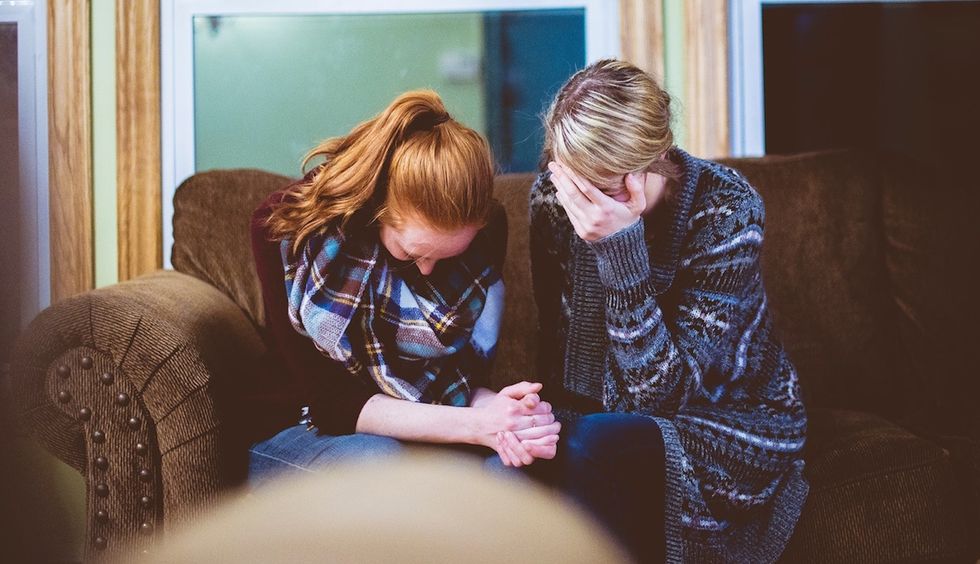I remember huddling in the bathroom at a wedding during the father-daughter dance, wiping away a few traitorous tears. A friend of mine whose father had passed away a year ago was there, too, rubbing away the trails of mascara down her cheeks.
I know it’s not the same thing she’s feeling, and I would not want to be in her shoes. But, for the moment, our very separate pain brought us to stand in the exact same place.
“You, too?” she asked me. “Sort of,” I mumbled in response.
More people filtered in and I slid out of the room before she could ask the unspoken question: how do you sort of lose a parent?
I wouldn’t have known how to answer the question if she asked, but I was in the process of finding out. And boy, was that shit complicated.
Human beings love to talk in vague absolutes about relationships: women are too picky, boys will just hurt you, friends are always there for you, your parents will always love you. In matters of the heart, we are always looking for the exceptions to the rule, the ones who will love us in spite of it all. Sometimes, we forget that there are other, unfortunate exceptions to laws of love: not everyone gets parents who will always love them.
You (sort of) lose a parent when they lie, cheat and manipulate you and other loved ones.
You (sort of) lose a parent when they voluntarily walk out of your life without a second glance.
You (sort of) lose a parent when they are emotionally abusive, neglectful and apathetic.
You (sort of) lose a parent in a million small and vast ways that eat away at your self-worth, your happiness and your livelihood.
It happened to me just weeks before I entered my second year of college. It came with divorce, desertion and depression. I knew my life would change when I left for school, I just never pictured this.
What kept me going, for a time, was the family I did have: my mom, my sister and our family dog. Whatever I did to keep moving, I could not stop for one second. Stopping meant coming to terms with a new reality.
That year, I had my best grades in college. I threw myself into school with ferocity and desperation. I earned my one and only 4.0 semester GPA. I worked multiple jobs, did independent studies and internships to keep myself afloat both academically and financially.
I started dating a caring, wonderful fraternity man, whose kinship with his brothers inspired me to join Greek life for myself. I found people I loved and trusted and who believed in me. I confessed all of my burdens to them.
The next year, I tanked. I was tapped out from running from this problem. I lost steam. I lost friends. But more than anything, I felt that I had lost myself.
I felt trapped between this idea of what aspects of my life were supposed to be, and what they turned out to be.
Had I missed out on the great and hidden meaning of family? Why didn’t my family look like my friends’ families? Why did people act as if this was somehow easier to handle because I was older? It wasn’t. It was horrible. I wanted help, and I didn’t know where to turn. I did not know how to define myself outside of this hurt.
I did not know how to define myself outside of what I meant to other people.
Someone told me something that changed my entire perspective. They listened to my story with empathy, and said to me, “parents can only do their best. It’s all anyone can do. But you can decide that their best just isn’t for you.”
I can decide.
My answer to you — the person who feels like some great, gaping hole has been left in their life because you did not have the picture-perfect family you saw on sitcoms and TV shows, the person who feels like their most defining characteristic is this great burden of pain you have to carry on your shoulders — is that parents do their best.
That is all they are capable of doing, and some are far, far more capable than others. Sometimes, their best just isn’t good enough. The only one who gets to be the judge of that is you. And if that is what you decide for yourself, then that is perfectly fine.
You decide when you are done grieving. You decide if you're the one who needs to walk away. You decide how your parents’ divorce or your completely valid and actual loss of a parental figure makes you feel. It is independent of how it makes your remaining family members feel. It is yours to work through and to overcome, and it is only a minor fraction of who you are.
To be perfectly clear, I don’t miss my dad anymore.
When I don’t visit home for a while, I miss my fun-loving, kind-hearted mother and my passionate, adventurous older sister. I miss my mom’s cuddly dog, Piper (aka my new little sister) and my furry little brother, Teddy, who is now chasing tennis balls in doggy heaven.
But the best part is, I don’t actually have to miss them at all — I am so incredibly lucky to have a phenomenal family that will answer whenever I call, send me funny videos to brighten my day or cheer me up, and will ultimately always be there for me.
I’m so, so deeply sorry if someone you loved walked away from you. But know this: you are still loved. You are worthy of that love. And above all else, you are not alone.





















